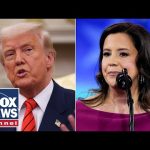Florida Congressman Byron Donalds has officially launched his campaign to succeed Governor Ron DeSantis, setting the stage for an intense 2026 gubernatorial race. With an early endorsement from former President Donald Trump, Donalds is positioning himself as the natural heir to DeSantis’ conservative legacy in the Sunshine State. His campaign kickoff in Bonita Springs was marked by strong rhetoric about continuing Florida’s trajectory as a “blueprint for what is possible in America,” focusing on issues like education reform, tax cuts, and restoring the Everglades.
Donald’s candidacy is notable for its historic implications. If elected, he would become Florida’s first Black governor, a milestone that would resonate nationally. As a staunch conservative and member of the Tea Party caucus, Donalds has built his career on advocating for limited government, economic growth, and parental choice in education. His alignment with Trump and commitment to conservative principles have already garnered him significant support within the Republican base, making him a formidable contender in a race that could define Florida’s political future.
However, Donalds faces challenges from within his party. Governor DeSantis has not endorsed him and has reportedly urged lobbyists to withhold financial backing, as speculation grows that Casey DeSantis may enter the race. Despite these hurdles, Donalds has taken the high road, praising DeSantis’ record while emphasizing his vision to build on the governor’s accomplishments. This strategy reflects a disciplined approach to consolidating support without alienating DeSantis loyalists—a calculated move in a state where the governor remains highly popular among conservatives.
Democrats are also watching this race closely, hoping to capitalize on any fractures within the GOP. While Florida has trended Republican in recent years, Democrats are energized after narrowing margins in recent special elections. Still, Donald’s early endorsement from Trump and his ability to galvanize conservative voters give him a significant advantage. Trump’s backing has historically proven decisive in Republican primaries, and Donalds is leveraging this momentum to rally support across Florida.
As the campaign unfolds, Donald’s ability to navigate internal GOP dynamics while maintaining focus on key issues will be critical. With over a year until the general election, he has ample time to solidify his position as the frontrunner. His candidacy not only represents a continuation of Florida’s conservative governance but also signals an effort to broaden the Republican coalition by appealing to minority voters who share traditional values. Whether he can overcome intra-party rivalries and Democratic opposition remains to be seen, but one thing is clear: Byron Donalds is emerging as a pivotal figure in Florida’s political landscape.




